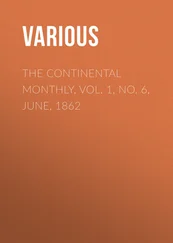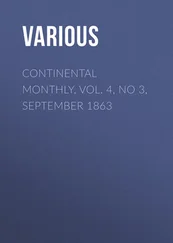Various - Continental Monthly , Vol. 5, No. 6, June, 1864
Здесь есть возможность читать онлайн «Various - Continental Monthly , Vol. 5, No. 6, June, 1864» — ознакомительный отрывок электронной книги совершенно бесплатно, а после прочтения отрывка купить полную версию. В некоторых случаях можно слушать аудио, скачать через торрент в формате fb2 и присутствует краткое содержание. Жанр: foreign_edu, periodic, Политика, на английском языке. Описание произведения, (предисловие) а так же отзывы посетителей доступны на портале библиотеки ЛибКат.
- Название:Continental Monthly , Vol. 5, No. 6, June, 1864
- Автор:
- Жанр:
- Год:неизвестен
- ISBN:нет данных
- Рейтинг книги:3 / 5. Голосов: 1
-
Избранное:Добавить в избранное
- Отзывы:
-
Ваша оценка:
- 60
- 1
- 2
- 3
- 4
- 5
Continental Monthly , Vol. 5, No. 6, June, 1864: краткое содержание, описание и аннотация
Предлагаем к чтению аннотацию, описание, краткое содержание или предисловие (зависит от того, что написал сам автор книги «Continental Monthly , Vol. 5, No. 6, June, 1864»). Если вы не нашли необходимую информацию о книге — напишите в комментариях, мы постараемся отыскать её.
Continental Monthly , Vol. 5, No. 6, June, 1864 — читать онлайн ознакомительный отрывок
Ниже представлен текст книги, разбитый по страницам. Система сохранения места последней прочитанной страницы, позволяет с удобством читать онлайн бесплатно книгу «Continental Monthly , Vol. 5, No. 6, June, 1864», без необходимости каждый раз заново искать на чём Вы остановились. Поставьте закладку, и сможете в любой момент перейти на страницу, на которой закончили чтение.
Интервал:
Закладка:
Various
Continental Monthly , Vol. 5, No. 6, June, 1864 / Devoted to Literature and National Policy
ERNEST RENAN'S THEORY
Christianity is a fact. We sometimes hear of men who are said to 'deny' 'Christianity.' The expression is nonsense. Men cannot deny the sun. Christianity has been a visible thing, on this planet, for eighteen hundred years. It has done a heavy amount of work, which is very visible too. It is altogether too late in the day to ' deny Christianity.'
That is the first thing to be understood. There is no arguing against the fact. You must take the fact and make the best of it. If your theory requires the annihilation of the fact, it's a bad thing for your theory, for the fact insists on staying. What an amount of fearfully laborious stupidity we would have been saved, if only that plain principle had been remembered!
Christianity has stood face to face with the world, for ages, a hard, stern, uncompromising reality. With a pair of tremendous arms it has worked, fought, endured, conquered, destroyed, builded, all over the earth. It has burned its brand into time. It has stamped its footprints in fire and brightness on earth and sea. It so stands, a great, wonderful, triumphant, flaming fact, blazing through the ages, flaming to the stars, melting, moulding, enlightening humanity.
The first thing to be remembered, then, by Christian and unbeliever alike, when they come to speak of Christianity, is that these things are not the matters in debate. They are the facts to be explained, to be accounted for. In all argument they themselves must first be taken for granted.
That is to say, here is this religion, certainly to any thoughtful man the most wonderful thing, take it all in all, that history has to tell about. It starts in an obscure corner of an obscure province. Its founder dies as a felon among felons. Its teachers are stupid peasants, fettered by a narrow dialect of an almost unknown tongue. Its whole origin is barbarous, ignorant, disgraceful by any worldly judgment. So it begins. As it spreads, imperial Rome takes alarm, and turns to crush the barbarous fanaticism, in the pride of her learning, civilization, and power. She plants her iron heel on the neck of the creeping sect. She presses it down with her gigantic weight. Time passes. The little sect that began in an obscure city of an obscure province, 'the number of the names together being an hundred and twenty,' in less than three centuries masters the world's crowned mistress, and plants its standard in triumph, to remain forever, on the Seven Eternal Hills. Resistless Rome is beaten to her knees, every national reverence, every national divinity trampled on, and spit upon, and the barbarous and disgraceful sect sets its ignominious mark, the cross of the condemned slave , on every monument of Roman reverence, on every trophy of Roman greatness.
There never was such an utter conquest. A pure idea, without a material hand or weapon, domineers over the greatest empire under the sun, in spite of the whole power of that empire armed to crush it.
And, after Rome fell, the huge carcase beaten to the dust, and torn to fragments by the wild creatures that hung upon her borders, this wondrous mystery, this barbarous, obscure faith alone remained, invincible among the powers of Rome. Roman civilization was crushed to the earth, as the Roman legions were. Roman law was trampled out of sight, as Roman art and literature were; but Christianity stood up and faced the Vandal and the Goth, the Frank and Saxon, as it had faced the Cæsars before, and dragged the conquerors of the empire suppliants at the feet of the church. It built a Christian Europe out of the savage hordes of Asia, and made an England, and a Germany, and at last an America out of wild Goth and Ungar, out of bloody Frank and savage Dane.
Now all this is simply matter of fact . My belief in Christianity does not add one jot to these facts. My disbelief does not take one tittle from them. So far as they are concerned, every man is a believer in Christianity. He believes it exists. He believes it has existed, has had such and such a history, has produced such and such results. 'Christian' and 'infidel' alike, to be reasonable, to have any ground for reasonable discussion, go thus far together.
They may differ in their explanations of the facts. That is the only ground of difference. There is the point of separation. It is perfectly logical too. Prima facie , we have no complaint to make that they do differ. And here lies the improvement in the modern type of 'unbeliever.' He does not take the line of his older brethren, and rudely assail Christianity as a mere imposture with Voltaire and Paine. That sort of work has had its day. He, on the other hand, freely admits its beneficent achievements. He has grown reasonable. He accepts Christianity, as the believer does, as a fruitful, beneficent, and conquering fact. He only holds that its existence and its achievements may be accounted for in a far more satisfactory way than we 'believers' have discovered.
Now all this is comprehensible, and it is really, now, the ground of difference between those who believe in Christianity as divine, and those who hold it to be merely human. It is a clear and simple issue. Christianity accounts for itself and its work on a certain plain, straightforward, and consistent theory. It holds that theory to be reasonable, complete, ample, for all the facts. A number of people join issue just here with Christianity. They admit its facts, but they deny its manner of explaining them. They claim to put forward other methods of explanation, which shall be more reasonable, more natural, and, at the same time, just as ample for the facts. We have had a number of these philosophers, with their theories, and they have had various fortunes. On the whole, the Christian world has gone on about as usual, accepting the old explanation, adopting the old theory, a hundred to one, and has dropped the new theories one after another, after more or less investigation, into profound oblivion.
Now we are free to admit the old theory has its difficulties. There are 'things in it hard to be understood.' There are mysteries and wonders which it does not attempt to explain. There are 'hard sayings' which it leaves hard. And the new theories always claim to have no difficulties. They blame the old one bitterly because it tolerates them. They themselves claim to be 'reasonable,' they 'explain' everything.
They therefore challenge the trial. If they fail to be 'reasonable,' or if they can only be reasonable at the expense of some of the facts—that is to say, if they find no place for some of the authentic facts, and so have to explain them away; or if, on the whole, they make too large drafts on our credulity, and demand too great a power of faith—we have the logical right to dismiss them out of our presence with scant courtesy, and are bound to hold by the old explanation still.
The last man who has come forward with his theory of Christanity is Monsieur Ernest Renan, a Frenchman, a member of the Institute, and a Semitic scholar of some considerable pretensions. He broaches his theory in a book, which he calls 'The Life of Jesus.' He offers it to the world, through that book, as an improvement on the accepted one. We propose here to look at M. Renan's theory, and see whether it has any advantages to offer over that usually taught in churches in America, and which the present writer learned, some lustra ago, while catechized at the chancel veil, and which his children are learning now.
It makes the examination easier that M. Renan freely and fully admits the achievements of Christianity. Indeed he glories over them. The beneficence of Christianity, its hallowing and elevating power in the history of the world, its wondrous blessedness among men, the glory it has cast over human life and human aims, the nobleness it has conferred on human character, all these he takes a pride in confessing and appreciating. He will not be a whit behind the stanchest believer in acknowledging the power of these, or in the capacity of prizing these.
Читать дальшеИнтервал:
Закладка:
Похожие книги на «Continental Monthly , Vol. 5, No. 6, June, 1864»
Представляем Вашему вниманию похожие книги на «Continental Monthly , Vol. 5, No. 6, June, 1864» списком для выбора. Мы отобрали схожую по названию и смыслу литературу в надежде предоставить читателям больше вариантов отыскать новые, интересные, ещё непрочитанные произведения.
Обсуждение, отзывы о книге «Continental Monthly , Vol. 5, No. 6, June, 1864» и просто собственные мнения читателей. Оставьте ваши комментарии, напишите, что Вы думаете о произведении, его смысле или главных героях. Укажите что конкретно понравилось, а что нет, и почему Вы так считаете.












